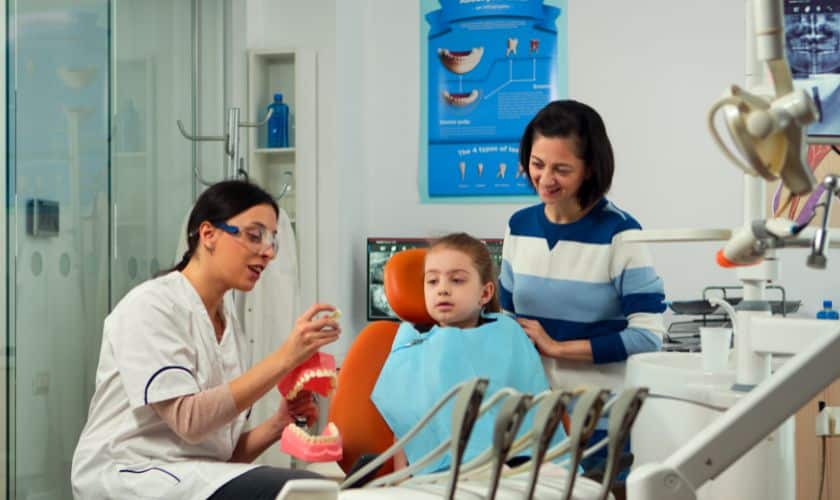Introduction
As parents, we always want the best for our children, including their oral health. Pediatric dental problems can be a cause of concern for many parents, but with proper knowledge and preventive measures, these issues can be minimized or even avoided altogether. In this blog post, we will discuss the top 5 pediatric dental problems and provide useful tips on how to prevent them.
Tooth Decay
Tooth decay is one of the most common dental problems in children. It occurs when bacteria in the mouth produce acids that attack the tooth enamel. To prevent tooth decay:
- Encourage regular brushing with fluoride toothpaste.
- Limit sugary snacks and drinks.
- Ensure your child visits the dentist for regular check-ups and cleanings.
Gum Disease
Gum disease, also known as gingivitis, is an inflammation of the gums caused by plaque buildup. To prevent gum disease:
- Teach your child proper brushing and flossing techniques.
- Encourage a balanced diet rich in fruits and vegetables.
- Ensure regular dental visits for professional cleanings.
Malocclusion
Malocclusion refers to misalignment of the teeth or jaws. It can lead to difficulties in chewing, speaking, and even breathing. To prevent malocclusion:
- Encourage your child to avoid thumb sucking or pacifier use after the age of three.
- Limit the use of bottles or sippy cups as your child grows.
- Consult an orthodontist if you notice any signs of misalignment.
Dental Trauma
Dental trauma can occur due to accidents or sports injuries, leading to chipped, broken, or knocked-out teeth. To prevent dental trauma:
- Ensure your child wears a mouthguard during sports activities.
- Childproof your home to minimize the risk of falls or accidents.
- Teach your child to avoid biting hard objects or using teeth as tools.
Tooth Erosion
Tooth erosion is the loss of tooth enamel caused by acid attacks.
Summary
1. Tooth Decay: Tooth decay, also known as dental caries, is one of the most common pediatric dental problems. It occurs when bacteria in the mouth produce acids that attack the tooth enamel. To prevent tooth decay, ensure your child brushes their teeth twice a day with fluoride toothpaste, limit sugary snacks and drinks, and schedule regular dental check-ups.
2. Gum Disease: Gum disease, or gingivitis, is an inflammation of the gums caused by plaque buildup. Encourage your child to brush their teeth gently and thoroughly, floss daily, and maintain a balanced diet to prevent gum disease. Regular dental cleanings and check-ups are also essential.
3. Malocclusion: Malocclusion refers to misalignment or incorrect positioning of the teeth. It can lead to difficulties in chewing, speaking, and even self-esteem issues. Encourage your child to avoid thumb sucking or prolonged pacifier use, as these habits can contribute to malocclusion. Early orthodontic evaluation can help identify and address any alignment issues.
4. Dental Trauma: Accidents happen, and dental trauma is a common occurrence among children. To prevent dental injuries, ensure your child wears a mouthguard during sports activities, avoids chewing on hard objects, and practices caution while playing. In case of dental trauma, seek immediate dental care.
5. Tooth Eruption Problems: Delayed or impacted tooth eruption can cause discomfort and affect the alignment of permanent teeth. Regular dental visits can help monitor your child’s tooth development and identify any potential issues. Maintaining good oral hygiene and a healthy diet can also support proper tooth eruption.
By being proactive and implementing preventive measures, parents can significantly reduce the risk of these common pediatric dental problems.

- Q: What are the top 5 pediatric dental problems?
- A: The top 5 pediatric dental problems are tooth decay, gum disease, tooth sensitivity, dental injuries, and malocclusion.
- Q: How can tooth decay be prevented in children?
- A: Tooth decay can be prevented in children by practicing good oral hygiene, limiting sugary foods and drinks, and scheduling regular dental check-ups.
- Q: What can be done to prevent gum disease in children?
- A: To prevent gum disease in children, it is important to encourage regular brushing and flossing, maintain a healthy diet, and visit the dentist for professional cleanings.
- Q: How can tooth sensitivity be avoided in pediatric patients?
- A: Tooth sensitivity in pediatric patients can be avoided by using a soft-bristled toothbrush, avoiding acidic and sugary foods, and using toothpaste specifically designed for sensitive teeth.
- Q: What measures can be taken to prevent dental injuries in children?
- A: To prevent dental injuries in children, it is important to use mouthguards during sports activities, avoid chewing on hard objects, and childproof the home to minimize the risk of accidents.
- Q: How can malocclusion be prevented in pediatric patients?
- A: Malocclusion can be prevented in pediatric patients by discouraging thumb sucking and pacifier use beyond a certain age, promoting proper oral habits, and seeking orthodontic evaluation if necessary.

Welcome to my website! My name is John Nangle, and I am a dedicated and passionate Pediatric Dentist with a strong focus on Cosmetic Dentistry, Orthodontic Solutions, and Dental Implants. With years of experience in the field, I am committed to providing exceptional dental care to children and adolescents, ensuring their oral health and beautiful smiles.

